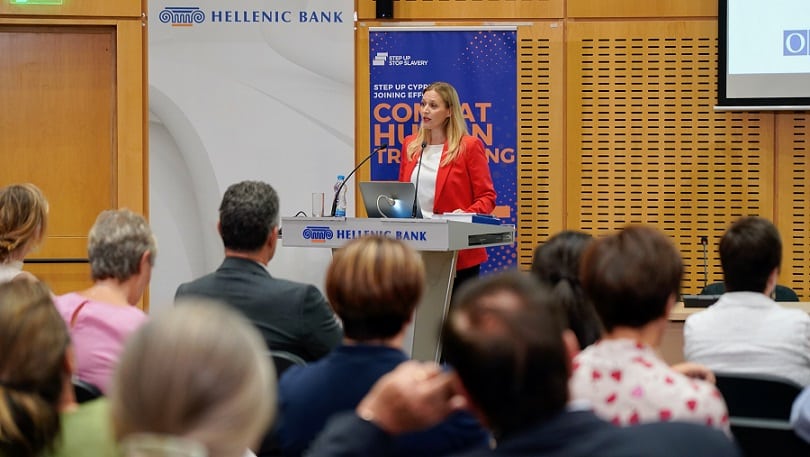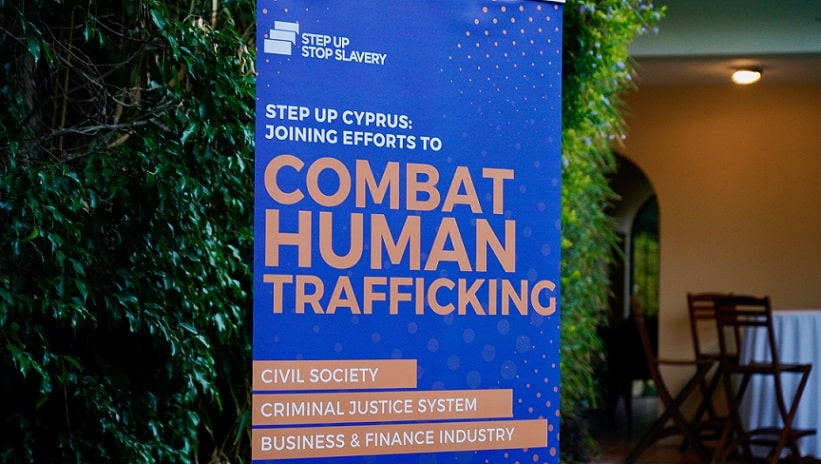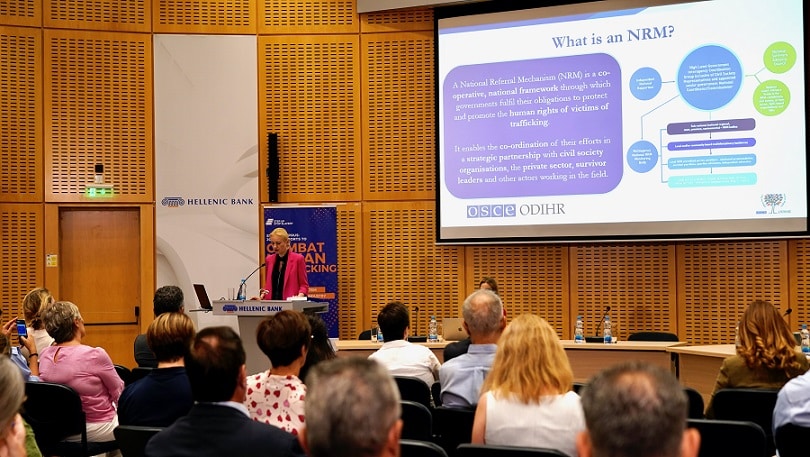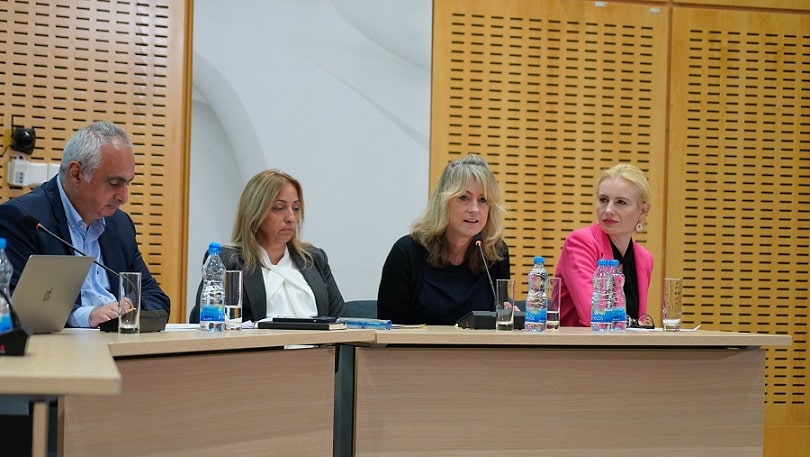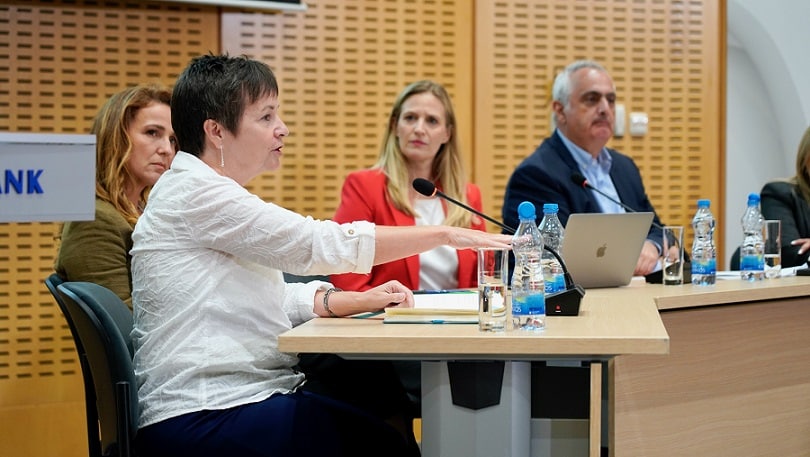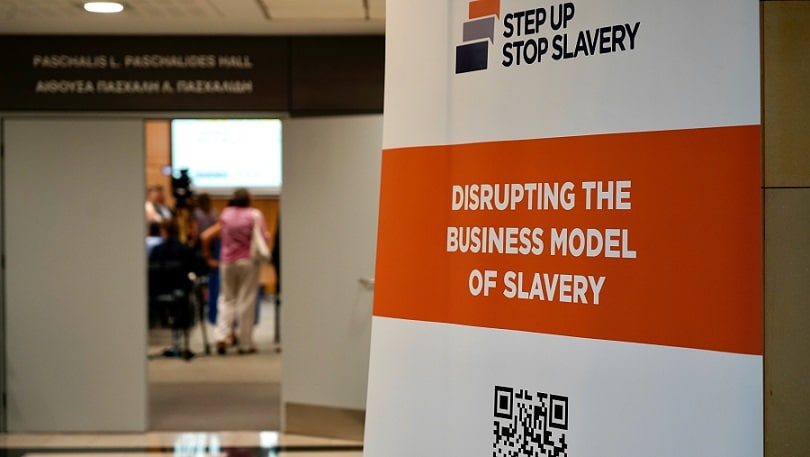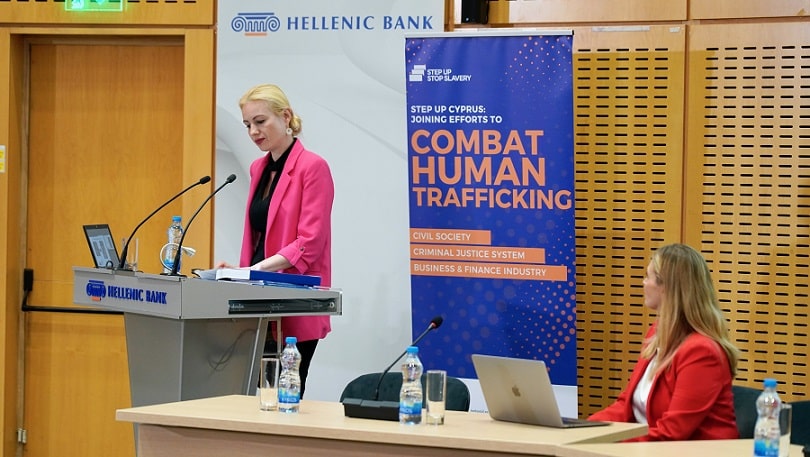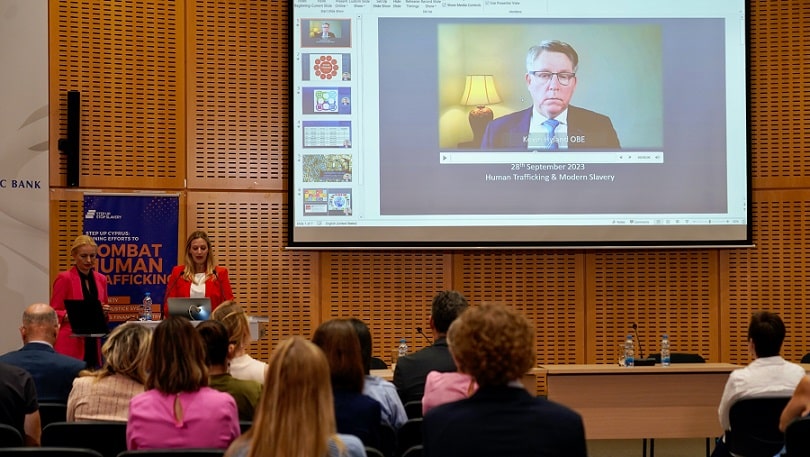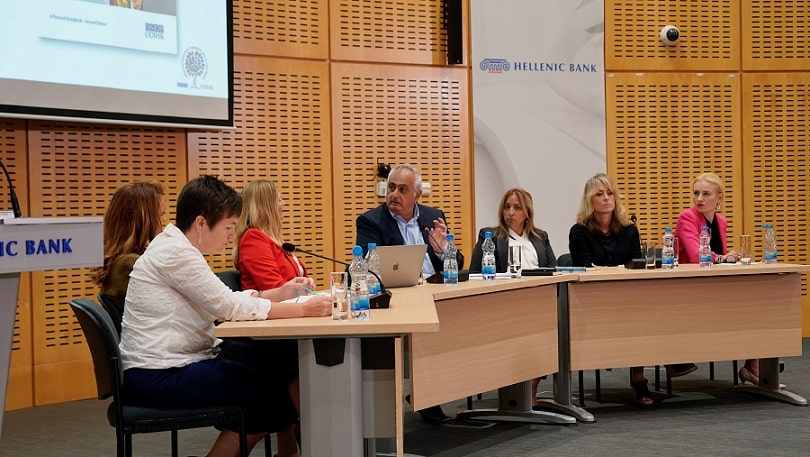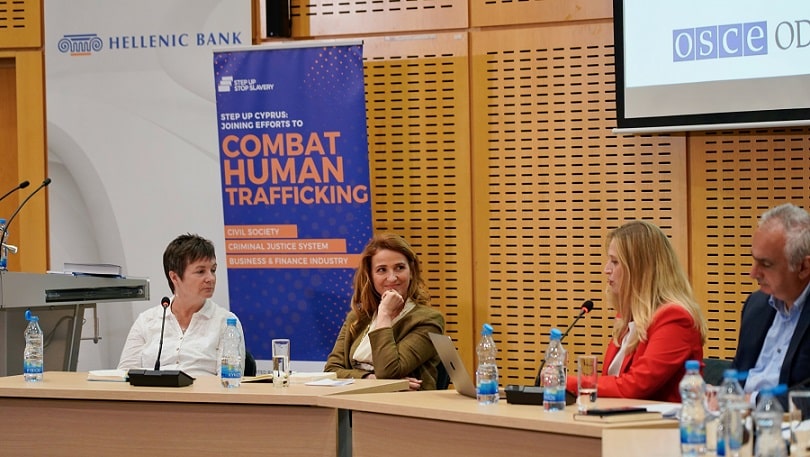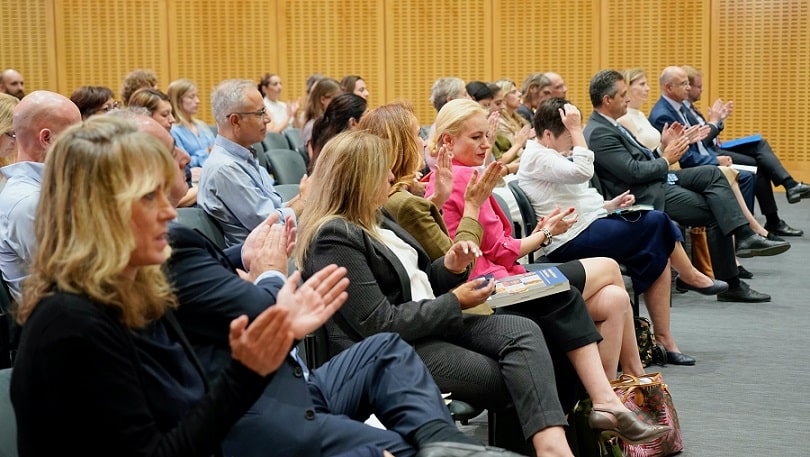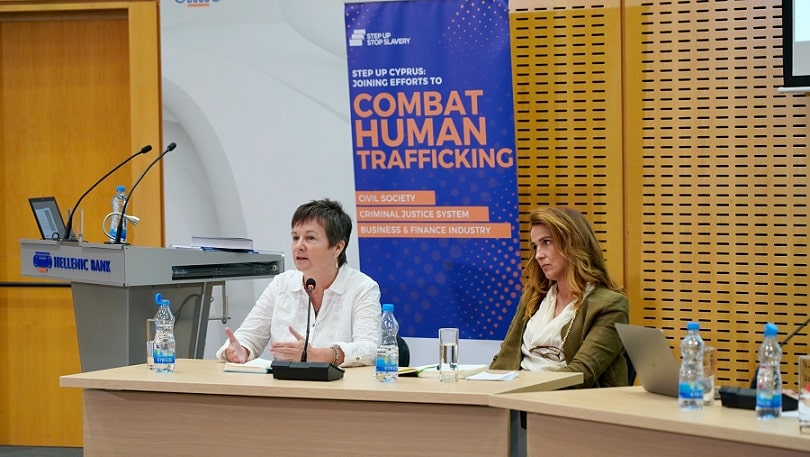Nicosia-based NGO Step Up Stop Slavery, founded and helmed by Modern Slavery Compliance Adviser and Consultant Katerina Stephanou, launched the ‘Step Up Cyprus: Joining Efforts to Combat Human Trafficking’ initiative over September 27-29, 2023, in collaboration with the British High Commission, the embassies of Sweden, the Netherlands and Ireland, with the support of the Cyprus Forum and Hellenic Bank.
Step Up Stop Slavery also hosted a week of related events that reflect a year-long effort to address shortfalls in trafficking prevention and harness best practices in Cyprus. This brought together the island’s civil society, criminal justice system and business and finance industry, as well as key international anti-trafficking experts.
Stakeholders from across Cyprus convened in a series of workshops, panel discussions and training sessions, which amplified the voices of Survivors, and specific training sessions for children were held in elementary and secondary schools on identifying and responding to signs of trafficking, and maintaining online safety for pupils and teachers.
The overriding theme of the ‘Step Up Cyprus’ activities and events was the need for Cyprus to have a fully effective and functional National Referral Mechanism (NRM) as well as an appointed, independent National Rapporteur on human trafficking.
Among the experts convening in Nicosia as part of the ‘Step Up Cyprus’ launch, Tatiana Kotlyarenko, OSCE/ODIHR Anti-Trafficking Adviser, addressed audiences on the requirement for appropriate NRM frameworks with an integral multi-disciplinary, trauma-informed approach and ethical survivor inclusion. Kotlyarenko has pioneered NRM assessments across the OSCE region, providing expert guidance to governments on how to establish NRMs, to prevent and combat human trafficking and bring an end to the impunity of traffickers.
According to the OSCE/ODIHR National Referral Mechanism Handbook, an NRM is a co-operative, national framework through which governments fulfil their obligations to protect and promote the human rights of victims of trafficking. It enables the co-ordination of their efforts in a strategic partnership with Civil Society Organisations (CSOs), the private sector, Survivor leaders and other actors working in the field.
Kotlyarenko and Rachel Witkin, Anti-Trafficking Practice Consultant, promoted use of the OSCE/ODIHR International NRM Handbook in Cyprus, explaining it contains accessible ‘how to’ guidance on the working methods, procedures and services required across the four ‘pillars’ of the NRM, namely:
- Identification and protection
- Individual support and access to services
- Social inclusion
- Criminal justice and redress
The role of an Independent National Rapporteur on Human Trafficking is also vital, as, per the Handbook:
“Independent national rapporteurs on human trafficking are responsible for monitoring the national implementation of anti-trafficking policies and reports findings. They conduct assessments of patterns and trends in human trafficking and measure the results of anti-trafficking activities. This includes collation of data, statistics and research, in close co-operation with relevant civil society organisations and research institutions.
“The national rapporteur contributes to the development of national and international policies and strategies relevant to combatting trafficking in human beings, and improves co-ordination and coherence between all NRM stakeholders and relevant agencies.”
Trauma-informed training for front-line professionals
Ahead of the ‘Step Up Cyprus’ launch, and as part of the EU-funded, bi-communal “United Action Against Human Trafficking” project, Step Up Stop Slavery joined with Turkish Cypriot NGO Refugee Rights Association to offer two workshops, titled “Trauma-Informed Professionals Sessions for Civil Society Organisations” at Nicosia’s Ledra Palace, over September 26-27, 2023.
Led by Anti-Trafficking Practice Consultant Witkin and Jane Lasonder, a voice for Survivors and a member of the International Survivors of Trafficking Advisory Board (ISTAC), the workshops empowered attendees with an understanding of the practical application of Trauma-informed methods of working, and adoption of a Survivor-centred approach.
Participants were taken through a series of practical and interactive exercises and engaged in lively discussion and reflection on the needs of frontline anti-trafficking responders in Cyprus. Witkin introduced attendees to The Trauma Informed Code of Conduct for All Professionals Working with Survivors of Human Trafficking (TICC), which enables front-line professionals in all disciplines to:
- Establish and maintain a mutual relationship of trust with Survivors in any working context or environment
- Impart a consistent sense of calm, security and safety throughout the course of their work
- Increase the confidence of Survivors and minimise the risks of causing distress and re‑traumatisation
- Remain safe and well in the course of their work, avoiding secondary traumatisation and professional ‘burnout’
“Trauma-informed methods for working with survivors are simple and effective, enabling professionals to obtain positive results in contexts which are often highly pressurised. It is possible to work swiftly and efficiently, while slowing communications to a manageable pace and providing appropriate reassurance for people who have experienced trauma. These methods support Survivors to understand all that is happening around them, and to make informed decisions, lessening the obstacles of confusion, distress and anxiety, said Witkin.
Lasonder shared insights drawn from her work with victims of human trafficking, shedding light on how front-line professionals can best help survivors to feel “safe, seen, heard and supported” and how it is vital to take into account their lived experience in policy-making and establishing effective NRMs.
“Survivor leaders want to stand up, they want to help, they want to advise, they want to help with policies, so why not set up National Survivor of Trafficking Advisory Councils (NSTACs) in each country? And this can be a bridge between stakeholders – it is so effective,” she said.
Earlier in the week, on September 25, 2023, with the support of NGO Step Up Stop Slavery, Witkin and Lasonder were also guest speakers at a UNFICYP-hosted townhall for military, police and civilian staff to raise awareness of the impact of Human Trafficking.
NRMs and the Cyprus Criminal Justice dimension
After the workshops, ‘Step Up Cyprus’ was officially launched on September 27, 2023 at a reception held at the residence of Irish Ambassador Conor Long, with Stephanou, Kotlyarenko, Lasonder and Witkin each speaking about the aims of the initiative.
The following day, a panel discussion on “The Criminal Justice Response to Human Trafficking” was held at the Hellenic Bank headquarters on September 28, 2023. In addition to Witkin and Lasonder, presenters and expert panelists included OSCE/ODIHR Anti-trafficking Adviser Kotlyarenko, Santa Marta Group Global Strategy Director and former UK Independent Anti-Slavery Commissioner Kevin Hyland, UK Judge Michelle Brewer, Cyprus Human Rights Lawyer Achilleas Demetriades, and Cyprus Police Anti-trafficking Unit Head Eleni Michail.
The panel was moderated by Step Up Stop Slavery’s Stephanou, and live-streamed to YouTube. Attendees included representatives of governmental departments, the police force, the island’s diplomatic community and CSOs, as well as members of the public and media.
Following addresses by British High Commissioner Irfan Siddiq, Swedish Ambassador Martin Hagström and Interior Ministry Director General Elikkos Elia, Kotlyarenko took to the podium to present the significance of National Referral Mechanisms in combatting human trafficking, and the impact and application of the second edition of the NRM Handbook.
A virtual address by Hyland followed, in which he drew attention to the fact that, whereas human trafficking is estimated to generate at least $150 billion for traffickers each year, only 0.2 per cent of victims are ever identified and criminals are rarely prosecuted or convicted. This leaves the world off track in terms of meeting Sustainable Development Goal (UN SDG) 8.7, which sets the target for States to end forced labour, modern slavery, human trafficking and child labour.
“By countries like Cyprus, and those in the EU, the UN and more widely internationally, by all of us taking this seriously, investing both in our resources, our finances, but also our moral leadership to deliver a process by which this crime does not benefit anybody, we can get to the point of delivering, or getting closer to delivering, SDG 8.7. This is when trafficking becomes a crime that doesn’t pay, and one that certainly you will face justice for,” said Hyland.
Echoing Hyland, with regards to ending trafficking for sexual exploitation, Demetriades noted that, in addition to outlawing prostitution, it was imperative to “follow the money”.
“If you find the source of the money, you deal with it,” he said, “and in order to do that, you need to trace, you need to freeze, you need to manage and then you need to confiscate the money. So, at the end of the day, you really have to make it a criminal act that doesn’t pay.”
Demetriades also commented on the insubstantial level of reparations available to victims of trafficking crime, as well as the onerous length of time it takes for victims to secure them from convicted traffickers via Cyprus’ civil process.
“You need to increase the amount and the resources which are available to the judge when imposing the traffickers’ sentence, so that the sentence makes sense in terms of the punitive side of things,” Demetriades explained. “Then you must find a way to speed up the civil procedure system – be that by getting an accelerated procedure or – something a bit more radical: you allow the criminal judge who has heard the evidence, to put on a ‘civil hat’ the day after the conviction, and hear the case as a civil damages case, having had the benefit of all the evidence in the criminal case. And within a month, you have your civil award, which will be compensatory and not punitive.”
Michail shifted the focus to the work of the Police Anti-Trafficking Unit, noting that: “after the COVID period, we re-evaluated our actions and procedures. We modified them and focused on two specific and major factors: the victim-centred approach, and the multidisciplinary approach”.
“For the first, we had a good result because, so far, we have had 14 convictions, which means the victims gave very good testimony before the court,” she said. “Regarding the multidisciplinary approach, we tried to enhance our cooperation with the stakeholders – not only from the governmental sector, but NGOs as well.”
Specialised trainings, a dedicated Survivor interview space and a four-digit hotline for anonymous trafficking tip-offs were also among the Anti-Trafficking Unit’s efforts to optimise their response to human trafficking.
That being said, Michail admitted to facing difficulties in police work, most importantly the length of time that criminal trials take. “We try to minimise this length of time to be more successful in our work. Also, we have to be more flexible with all our procedures because the trends of trafficking change from day to day, and from country to country,” she added.
Judge Brewer explained the significance and application of the non-punishment principle, which protects victims of trafficking against prosecution for crimes they were compelled to commit, as a result of being trafficked. As lead counsel in the landmark 2021 case of VCL v UK, she and her legal team were successful in establishing that the principle fell within the scope of Article 4 ECHR protection.
“If you do not have, enshrined in your own jurisdiction, the ‘non-punishment principle’ – that you do not punish the trafficking victim for their criminal offences that were committed during the course of their trafficking – you undermine the entirety of the protections that are necessary for victims,” she said.
Judge Brewer also stressed that for a prosecution or appeal to succeed, a case must be managed correctly far earlier in the process, with civil society providing support to those coming though the justice system.
Eradicating forced labour from supply chains
A further ‘Step Up Cyprus’ event saw an open discussion on “The truth about business – forced labour and what we must do about it”, held on September 29, 2023 at Old Nicosia’s Classic Hotel, as part of this year’s Cyprus Forum programme, with Stephanou as moderator.
Following an address by Cyprus Department of Labour Director Alexandros Alexandrou, Hyland once again joined the event virtually, describing the challenge of tackling labour exploitation as “a wicked problem” – one that is difficult or impossible to solve because of incomplete, contradictory, and changing requirements that are often difficult to recognise.
“Beyond a moral imperative to eliminate labour exploitation from supply chains, it is important we see trafficking as a crime that is commensurate with crimes like terrorism, with crimes like money-laundering, with crimes like corruption, and we treat it at that scale, and not, as we are at the moment, project-based,” he said.
Further input was offered as virtual attendees by Consultant Survivor Leader and UK national standards body, the British Standards Institute (BSI) Committee member Keith Lewis, and BSI Lead Standards Development Manager Dave Adamson, and in person by Judge Brewer, Lasonder and Witkin.
‘Trafficked in plain sight’
Attendees learned of Lewis’ harrowing experiences of enduring eight years being trafficked in plain sight for forced labour exploitation and how, despite his intense physical and mental suffering, neglected clothing, hygiene and appearance, his circumstances were never challenged by the many people for whom Lewis’ traffickers put him to work.
As a Survivor Leader today, Lewis is proposing that Health and Safety licensing of all kinds, across all countries, should be directly attached to Anti-Human Trafficking and Modern Slavery licensing and inspectorates:
“If you are being held against your will, working long hours for little or no pay, it is a health and safety risk, and I believe that Modern Slavery and Human Trafficking should be an issue that is directly attached to health and safety licensing,” he said. Lewis describes passing through many public venues that were health and safety licensed, with signs on the walls that stated this. He is currently working with Adamson and the BSI on internationalising standards on responses to human trafficking/modern slavery.
Guidance on managing modern slavery risk
Adamson, for his part, drew attention to the BS 25700, the BSI’s pioneering new guidance document for organisations, on managing modern slavery risks in their operations, supply chains and wider operating environment. Globally, over 40 million men, women and children are believed to held in modern slavery, and to manage the risk of modern slavery exposure, businesses must first recognise it is a current and prevalent problem, often hidden in plain sight.
“Standards are an agreed way of doing things,” explained Adamson. “They are agreed for the terminology that we’re using in this area – ‘modern slavery, human trafficking, debt bondage’ – but they are also agreed in terms of processes, procedures, the protocols, methodologies.
“BS 25700 is a comprehensive standard that’s written for the lay person and for those people who are more advanced in combating the risk of Modern Slavery,” he continued. “So now, with the British Standard published, we have determined that it can go international.”
The International Organisation for Standardisation (ISO) has 169 countries and offers members an opportunity to work together to identify, develop and promote the Standards that they’re creating.
The ISO has established a working group for the development of the standards on human trafficking, forced labour and modern slavery, a member of which is Stephanou, having been appointed as the Republic’s national representative by the Cyprus Organisation for Standardisation (CYS).
Accountability for tainted supply chains
Judge Brewer drove home the reputational cost to businesses whose supply chains are exposed as furthering the work of traffickers, and thereby profiting from labour exploitation.
“In 2021, NGOs from France, Germany and the Netherlands made complaints to the International Criminal Court (ICC) about business practices, essentially infringing crimes against humanity, forced labour, child labour and enslavement, and those are now being investigated domestically, against those businesses in those countries,” she said.
“We will have to see what the ICC is going to say about their own jurisdiction, but this, I think, is an indicator of the movement that is happening now: to call to account businesses that engage in human rights violations.”
In closing the discussion, the final words were given to Lasonder:
“My message is: open your eyes, don’t leave people invisible – people that are visible in plain sight,” she urged. “Imagine it’s your child, your mother, your daughter, your sister – would you want somebody to see them and take them to safety? So, then you have the responsibility today, to look at somebody else and make them visible.”
The ‘Step Up Cyprus’ initiative will continue with a year-long calendar of events and workshops; a conference on business and forced labour is planned for October 2024.
About Step Up Stop Slavery
Established in 2019 by human trafficking and modern slavery compliance consultant Katerina Stephanou, Step Up Stop Slavery’s mission is to disrupt HT and MS via multi-disciplinary collaboration, Trauma-informed education and Survivor support.
The organisation is in the process of establishing Cyprus’ first Support Centre to assist Survivors with the legal support to rebuild their lives, secure justice and reparations, and receive psychological and social welfare support.
Step Up has also initiated Cyprus’ first prevention programme in schools, training teachers and designing curriculum for 4- to 18-year-olds on child trafficking and online safety.
Additionally, the NGO’s efforts saw Cyprus become the first OSCE member in 2020 to pilot OSCE’s the ‘Follow the Money’ project, focusing on a collaborative partnership between law enforcement, banking and the financial intelligence unit MOKAS, for the identification of proceeds emanating from modern slavery and human trafficking in the banking industry.
This post was originally published on this site be sure to check out more of their content.




